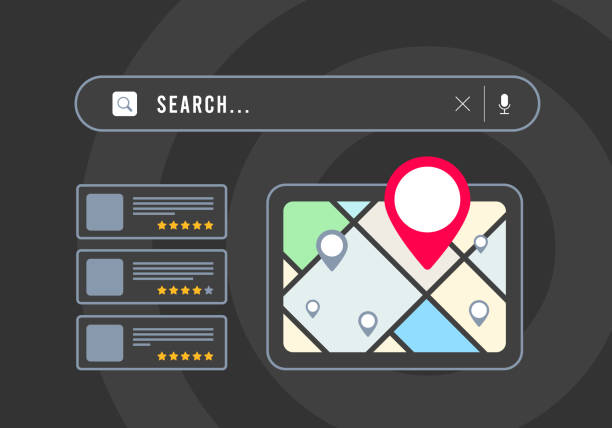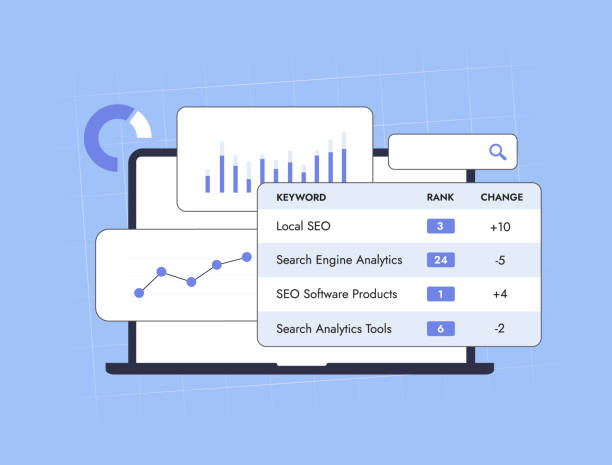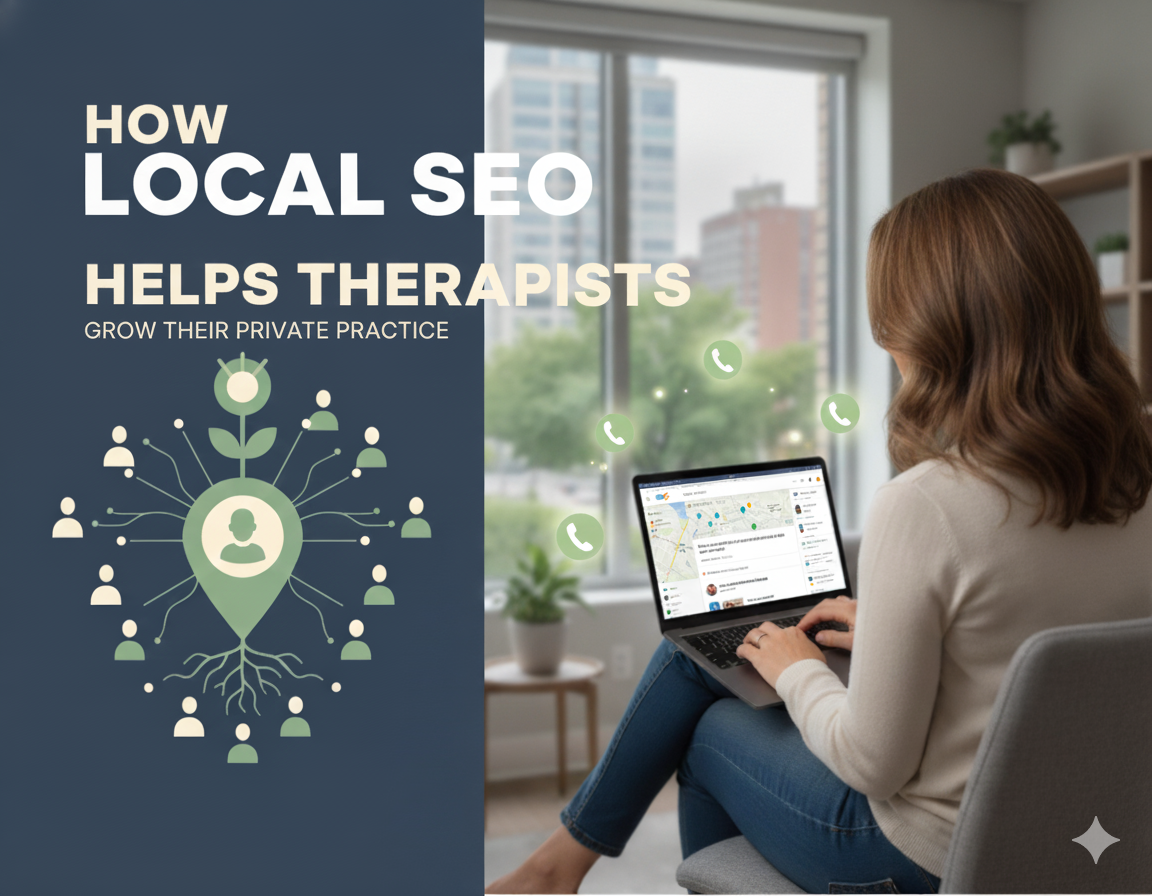Local SEO for therapists has fundamentally changed how therapy clients find and evaluate mental-health providers. While referrals, word-of-mouth, and insurance directories once drove a majority of inquiries, today most clients begin their journey online, specifically with Google. Whether searching for “therapist near me,” “anxiety counseling in Austin,” or “EMDR therapist in Denver,” people rely heavily on local search results to assess credibility and make first contact.
For therapists in private practice, this shift introduces both an opportunity and a threat. Google’s Local Map Pack captures a significant share of clicks far more than organic website listings. If your practice is not prominently visible in the Map Pack or the top local organic results, you are effectively invisible to potential clients, even if you offer superior clinical care.
Local SEO is also uniquely valuable for therapy practices because mental-health services are inherently local, trust-driven, and high-intent. Prospective clients are not casually browsing; they are actively seeking support. Strong visibility in local search correlates directly with client acquisition, caseload stability, and long-term practice growth.
As specialized partners in therapist-focused digital strategy, Mental Health IT Solutions supports practices with SEO frameworks aligned with clinical ethics, HIPAA-safe practices, and therapist-specific user intent. Our approach to SEO for therapists particularly Local SEO provides a clear, step-by-step framework that consistently increases visibility, supports private-pay growth, and strengthens long-term practice stability through effective SEO marketing for therapists.
What Is Local SEO for Therapists?

Definition
Local SEO refers to the optimization techniques that help your therapy practice appear in Google’s local search results, particularly:
- Google’s Map Pack
- Local organic listings
- Google Business Profile (GBP)
Google uses a combination of location, query intent, and relevance signals to match local users with nearby therapists who meet their needs.
In practice, Local SEO ensures that when someone searches for a mental-health provider in your area, your practice appears at the top of the results consistently, credibly, and prominently.
Therapist Local Keyword Examples
These represent real, high-intent keywords:
- “therapist near me”
- “EMDR therapist in Denver”
- “LMFT in Seattle”
- “Black therapist in Los Angeles”
- “CBT therapist in Austin”
- “couples therapist near me”
- “trauma counselor Chicago”
Each keyword reflects local intent, meaning the user is searching for a provider they can book soon.
YMYL & Why Therapy Websites Are Treated Differently
Therapist websites are classified under Google’s Your Money or Your Life (YMYL) category, which demands higher scrutiny because mental-health services impact personal well-being.
Local SEO for therapists therefore requires:
- Demonstrable expertise
- Accurate, non-sensational mental-health information
- Secure, trustworthy website architecture
- Consistent identity and branding
Google ranks therapist sites only when they meet these trust, safety, and authority standards.
Why Local SEO Matters for Therapists

Local Pack Dominates Clicks
Google Maps + Local Pack captures the majority of local user attention. Users want fast, nearby matches with:
- Ratings
- Hours
- Location
- Contact information
- Booking options
Strong Local SEO ensures your practice is among the top three results, where nearly all clicks occur.
High-Intent Local Searches
People searching for therapy locally are not passive browsers. They are actively seeking help. These searches are conversion-ready because:
- Clients are prepared to book quickly
- Searches match real symptoms and needs
- Local SEO shortens the decision-making cycle
Reduces Dependence on Paid Directories
Most therapists rely heavily on:
- Psychology Today
- TherapyDen
- Zocdoc
- Insurance panels
Local SEO reduces this dependency by giving you direct, independent visibility on Google.
Compounding, Long-Term Results
Local SEO grows stronger with time as:
- Reviews accumulate
- Content expands
- Domain authority increases
Unlike ads, SEO results do not disappear when spending stops.
Early Competitive Advantage Becomes Permanent
In saturated therapy markets, early adopters of Local SEO build a lasting edge. Once a practice becomes the most relevant local authority, new competitors struggle to outrank them.
Ethical Marketing Standards
Marketing in a mental-health context must be:
- Subtle
- Accurate
- HIPAA-safe
- Non-coercive
Local SEO supports a compliance-friendly, educational visibility model.
Superior Long-Term ROI
Compared to:
- Paid ads
- Social media
- Referrals
Local SEO consistently delivers the highest long-term return for therapy practices.
For deeper local strategy background, refer to: Local Marketing for Therapists
How Google Ranks Therapy Practices in Local Search

Google uses three primary ranking factors: proximity, relevance, and prominence.
Proximity
How physically close your practice address is to the user’s location at the time of the search.
Relevance
How closely your services match the query. This involves:
- GBP primary category (e.g., “Psychotherapist,” “Counselor,” “Mental Health Clinic”)
- Optimized business descriptions
- Local landing pages
- Service pages aligned with specialties
- On-page keyword optimization
Prominence
Measures your practice’s overall local authority, including:
- Number and quality of Google reviews
- Backlinks from reputable websites
- Local directory citations
- Website authority
- Behavioral signals (clicks, calls, map actions, dwell time)
Local SEO succeeds when all three factors reinforce one another.
Step-by-Step Local SEO Strategy for Therapists
STEP 1: Optimize Your Google Business Profile (GBP)
Your GBP listing is the foundation of Local SEO. It must be:
- Fully completed
- Accurate
- Optimized for clinical relevance
- Updated consistently
Core Elements to Optimize
- Claim and verify the listing
- Set correct categories
- Add HIPAA-safe photos
- Use a professional, keyword-specific description
- Add all services offered
- Add hours, telehealth availability, and location
- Complete the Q&A section
For deeper website-side optimization guidance, reference: How to Optimize Your Mental Health Website for More Bookings
GBP Posting Strategy for Therapists
Therapists underutilize GBP Posts, yet consistent posting significantly improves local visibility.
Why Posting Matters
- Reinforces key service keywords
- Signals relevance to Google
- Improves freshness, which boosts rankings
- Helps Google understand specialties and location
Posting Frequency
- Ideal: 2–3 posts per week
- Minimum: 1 post per week
Types of Effective GBP Posts
- Service highlight posts
- Educational micro-content
- New blog announcements
- Local community involvement
- Office updates and professional introductions
Local Keyword Integration
Examples:
- “anxiety therapy in Austin”
- “trauma therapist near me”
- “couples counseling in Denver”
Post Examples
Service Post:
“Struggling with anxiety in Denver? We offer evidence-based CBT for chronic stress and panic symptoms. In-person & telehealth options available.”
Local Relevance Post:
“Looking for couples counseling in Austin? We help partners rebuild trust and strengthen communication.”
Educational Post:
“Feeling overwhelmed? Here are three grounding techniques we teach clients to manage daily stress.”
Photo Optimization
Upload HIPAA-safe images weekly:
- Office exterior
- Therapy room setups
- Team introductions (no clients)
STEP 2: Maintain NAP & Citation Consistency
NAP = Name, Address, Phone Number.
Citations must be:
- Accurate
- Consistent
- Identical across platforms
Key Directories
- Psychology Today
- Healthgrades
- TherapyDen
- GoodTherapy
- CareDash
- Yelp
- Bing Places
- Local directories
Duplicate listings harm the local authority; ensure they are merged or removed.
For in-depth guidance, see: Local SEO Guide for Behavioral Health Therapists
STEP 3: Create High-Converting Local Landing Pages
Local landing pages strengthen relevance and improve Map Pack ranking.
Structure Template
H1: Service + City
Example: “Anxiety Therapy in Chicago”
Sections Include:
- City-focused introduction
- Clinical approach
- Why local clients choose your practice
- Insurance vs private pay
- Embedded Google Map
- Neighborhoods served
- Local FAQs
- Strong call-to-action
Internal Linking Strategy
Internal links strengthen SEO authority.
Include:
- Service-to-service links
- Blog cluster links
- Links to location pages
- Link to GBP (business.site)
For in-depth guidance, see: Content Marketing Strategies to Engage Mental Health Clients
STEP 4: Local Keyword Research for Therapists
Types of Local Keywords
- Transactional: “trauma therapist in Atlanta”
- Informational: “how EMDR works for PTSD”
- Symptom-based: “anxiety symptoms at night”
- City-modified: “CBT therapist Austin”
- Neighborhood-specific: “therapist in Capitol Hill Denver”
Tools
- Google Keyword Planner
- Ahrefs
- SEMrush
- Google Search Console
- GBP Insights
How Therapists Can Use AI Tools to Strengthen Local Search Performance

AI has become a practical asset in modern Local SEO, enabling therapists to improve visibility, analyze user behavior, and optimize their online presence with far greater precision. When used correctly, AI tools can streamline complex SEO tasks, reduce guesswork, and support more informed decision-making—while still adhering to ethical, HIPAA-safe marketing standards.
AI-Assisted Keyword Discovery and Intent Analysis
Therapists can use AI-powered keyword research tools to identify high-intent, location-specific search terms that clients are actively using. Unlike traditional keyword tools that rely solely on volume metrics, AI models analyze user patterns, semantic variations, and conversational search queries—especially valuable for voice search optimization.
AI tools help therapists uncover:
- Symptom-based searches (“why do I feel anxious at night?”)
- Local intent phrases (“best EMDR therapist in Denver”)
- Natural-language voice queries (“Where can I find a couples counselor near me?”)
This ensures therapy websites align with how people genuinely search for care.
AI-Generated Content Outlines and Optimization
AI content assistants can accelerate the creation of local landing pages, service descriptions, and FAQ sections while maintaining accuracy and clinical professionalism. Although therapists must write or review final text to ensure ethical integrity and contextual accuracy, AI tools provide:
- SEO-optimized outlines
- Local keyword placement suggestions
- Title and meta-tag recommendations
- Position-zero/featured snippet targeting
This improves content quality while preserving time for clinical work.
AI for Google Business Profile Insights and Optimization
AI-powered analytics platforms can interpret GBP performance trends—such as peak search hours, rising local queries, and competitor positioning. They also assist therapists in identifying opportunities to optimize:
- GBP descriptions
- Services list
- Local categories
- Weekly GBP posts
By analyzing user actions (calls, website clicks, direction requests), AI helps therapists refine their local strategy with data-driven precision.
AI Tools for Review Monitoring and Sentiment Analysis
Maintaining a positive reputation is essential to local ranking. AI sentiment tools can review patterns across:
- Client feedback
- Public reviews
- Online mentions
- Directory listings
They detect recurring themes (e.g., responsiveness, specializations, scheduling difficulties) so therapists can adjust service delivery or website messaging accordingly—without violating HIPAA boundaries.
AI-Powered Website Audits and Technical SEO Checks
AI-driven audit tools can evaluate a therapy website for:
- Page speed
- Mobile responsiveness
- Schema implementation
- Crawling/indexing errors
- Content gaps
- Duplicate pages
These insights allow therapists to correct technical issues that directly affect Map Pack visibility and local ranking strength.
Predictive Analytics for Local Demand and Service Trends
Advanced AI platforms can predict rising search patterns (“trauma therapy near me,” “child anxiety treatment”), helping therapists plan content and service pages before competitors do. This forward-looking approach strengthens topical authority and positions the practice as a leading resource.
Understand – How AI is Changing SEO for Counsels
Optimizing Therapy Practice Locally for Voice Search

Voice search has become a critical component of local discovery, especially as more users rely on Siri, Google Assistant, and Alexa to find nearby mental-health providers. Voice queries are often urgent, conversational, and highly location-specific, making them an important part of a therapist’s Local SEO strategy.
How Voice Search Influences Local Visibility
While typed searches tend to be short (“anxiety therapist near me”), voice searches reflect natural speech:
- “Where can I find an anxiety therapist near me?”
- “Who is the best trauma therapist in Denver?”
- “Find a couples counselor open today.”
These queries are longer, more detailed, and indicate strong booking intent. Optimizing for them helps therapists appear in:
- Voice-powered search results
- Google’s local Map Pack
- Featured snippets
Key Voice Search Optimization Techniques
1. Use Natural-Language, Long-Tail Keywords
Integrate question-style and conversational phrases into:
- Local landing pages
- Services pages
- FAQs
- Blog posts
Example: “Where can I get CBT for anxiety in Austin?”
2. Expand Local FAQ Sections
Voice assistants often pull answers from FAQs.
Include questions such as:
- “Do therapists in Seattle offer EMDR?”
- “Where can I find weekend therapy sessions in Atlanta?”
3. Strengthen Google Business Profile Signals
Voice search frequently uses GBP data. Ensure:
- Complete services
- Natural-language descriptions
- Keyword-aligned GBP posts
- Updated Q&A
4. Improve Site Speed & Mobile Performance
Voice search prioritizes pages that load fast and work well on mobile.
5. Use Schema Markup
LocalBusiness and MedicalBusiness schema help Google understand:
- Your location
- Services
- Hours
- Contact details
This increases eligibility for voice-result answers.
Build Local Content That Google Trusts
Localized Blog Topics
- “Best therapists for anxiety in Brooklyn”
- “How EMDR is helping trauma survivors in Phoenix”
Local Resource Pages
List:
- Crisis hotlines
- Local hospitals
- Community mental-health centers
- Support groups
City-Based Mental Health Guides
Local ‘Best Of’ Lists
- Best yoga studios for stress relief
- Best psychiatric providers for medication management
Topic Clusters
Build clusters around core clinical specialties: anxiety, trauma, couples therapy, teen therapy, etc.
For additional guidance: How to Build a Strong Online Presence as a Therapist
Ethical & HIPAA-Safe Review Strategy
What You Can Say
- Ask generally for a review
- Request feedback without referencing services
- Share review links in a neutral context
What You Cannot Say
- Confirm someone is a client
- Mention treatment details
- Respond with private information
Review Request Templates
- Post-session (neutral language)
- Email signature link
- Automated follow-up messages
Automation Ideas
- QR code in office
- Review link in appointment reminders
- CRM-triggered review sequences
Safe Response Framework
- Thank the reviewer
- Avoid specifics
- Keep tone professional
Local Backlink Strategy for Therapists
Easy Backlinks
- Chamber of Commerce
- Local business directories
- Community organizations
Medium Difficulty
- Guest blog contributions
- Local podcasts
- Mental-health events
High Authority
- Universities
- Hospitals
- Government programs
- Nonprofit partnerships
Tracking Local SEO Performance
Tools
- Google Business Profile Insights
- Google Search Console
- Local Falcon (geo-grid scans)
- BrightLocal
Primary KPIs
- Map Pack rankings
- Calls and direction requests
- Profile interactions
- Local landing page clicks
- Review count + quality
Therapy SEO vs Regular Local SEO
Therapy SEO requires unique expertise due to:
- Ethical limits on claims
- HIPAA compliance
- Clinical language moderation
- Use of E-E-A-T (Experience, Expertise, Authority, Trust)
- Restricted advertising rules
General SEO rules do not safely apply to mental-health practices.
Local SEO Mistakes Therapists Must Avoid
- Inconsistent NAP
- Duplicate directory listings
- Keyword stuffing
- Using template content duplicates
- Not posting on GBP
- Wrong business categories
- Missing service pages
- Missing local landing pages
- No internal linking
- No schema markup
FAQs
What is Local SEO for therapists?
Local SEO for therapists helps your practice show up when people in your area search for terms like “therapist near me” or “anxiety therapist in [city].” It focuses on optimizing your Google Business Profile, website, reviews, and citations to increase visibility in the Local Map Pack.
Why is Local SEO important for therapists and counselors?
Most clients search online before choosing a therapist. Appearing in the top local results increases trust, visibility, and private-pay inquiries. It also reduces dependence on paid directories and expensive ads.
How can I get my therapy practice to rank in the Google Map Pack?
You need a fully optimized Google Business Profile, consistent NAP data across directories, high-quality local landing pages, regular GBP posts, ethical reviews, and local backlinks.
How long does Local SEO take to show results for therapists?
Most practices see improvements within 4–8 weeks, with stronger gains in 3–6 months. Timelines depend on local competition, content quality, and the strength of your GBP optimization.
Do I need a physical office to rank locally?
Yes. Google requires a business address to show you in the Local Map Pack. Telehealth-only practices can still rank organically, but cannot appear in the Map Pack without a physical location.
Final Words
Local SEO is no longer optional for therapy practices; it is a critical driver of long-term visibility, client acquisition, and practice sustainability. Because mental-health services are deeply personal and locally delivered, strong placement in Google’s Map Pack and local organic search directly influences client trust and booking behavior.
A comprehensive Local SEO strategy requires a combination of:
- Optimized Google Business Profile
- High-quality local landing pages
- Ethical review generation
- Accurate citations
- Strategic content
- Strong internal & external linking
- Consistent posting and maintenance
Mental Health IT Solutions supports therapists across these areas, offering a specialized digital framework built exclusively for mental-health professionals.







